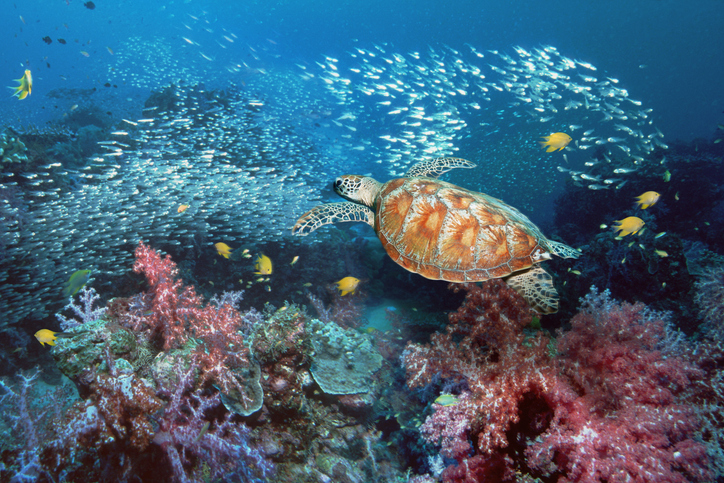Overhunting, ecosystem destruction and climate change caused by human emissions are all contributing to a rapid decline of global biodiversity.
A new report released by the World Wildlife Fund, an NGO, highlights what humanity is losing as a result.
From the large whales that mix ocean waters and make them more able to sustain life to tapirs that help the Amazon forest grow and provide rainwater to South America, the planet’s biodiversity is deeply connected to humanity’s well-being.
FISHING AND HUNTING
Hunting and fishing have been central to cultures throughout human history, and wildlife remains a key source of food and employment for humans.
Wild animal meat accounts for up to 80% of the animal protein consumed by populations in some rural regions of West and Central Africa, which makes it key both to the local economy as well as to food security, said the WWF report.
Humans also consume up to 2,500 freshwater fish species, research published in 2023 by the WIRES Water journal said, and a 2011 report in the Fish and Fisheries journal estimated that marine fisheries provide more than 200 million full-time jobs globally.
However, a decline in wild animal populations is harming fishing businesses and making less food available.
A study published in 2021 in the ICES Journal of Marine Science by researchers in Canada and Germany showed, for example, that cod catches in Eastern Canada reached a peak in 1968, at 810,000 tons, but fell to 10,559 tons in 2019 following a collapse in fishing stocks.
ECOSYSTEM ENGINEERING AND REGULATION
Biodiversity is also central to ecosystem engineering and regulation – the process by which organisms shape habitats.
Extinction of one living being often leads to cascade effects that threaten whole ecosystems.
In grassland ecosystems, hoofed terrestrial herbivores compact the bare ground and soil, altering landscapes and promoting higher biodiversity, a 2024 assessment of research published in the Nature Ecology & Evolution journal showed.
Predators, meanwhile, contribute to keeping herbivore populations under control, limiting the risk of soil erosion from overgrazing, a 2014 report in the Science journal said.
In the oceans, sperm whales mix water and move nutrients through ocean layers with their large bodies, nourishing ecosystems and providing fishing grounds.
It is estimated, however, that great whale numbers have declined between 66% and 90% since commercial whaling began about 1,000 years ago, which means that they are making less of a contribution to keeping oceans plentiful.
ECOSYSTEM SERVICES
Biodiversity is essential to keeping ecosystems healthy and able to provide humanity with what are called ecosystem services such as food, crop pollination, soil protection, cooling, fresh water and even leisure.
Research published in 2020 by the Proceedings of the Royal Society B journal showed that five out of seven crops studied in the United States already lacked enough pollinators, such as bees, to secure full development.
This means production would likely be greater if there were more insect biodiversity.
In the case of the Amazon, a 2019 paper published in the Biotropica journal by Brazilian researchers found that tapirs distribute seeds over long distances and help speed the recovery of disturbed forests.
Water from the Amazon forms clouds that pour rain over much of South America, making it crucial for drinking water, agriculture, cooling and protection from wildfires.
Globally, destruction of natural areas coupled with climate change enabled 4.3 million square km of land (1.7 million square miles), an area larger than India, to turn dry between 1990 and 2020, according to figures released in 2024 by the U.N.
As the world dries up, it becomes more vulnerable to extreme climate events such as drought and the wildfires that hit South America in 2024 and now are spreading in California.
HUMAN PHYSICAL AND PSYCHOLOGICAL WELL-BEING
Biodiversity loss is also connected to humans suffering more from infectious diseases, according to a 2024 assessment of more than 2,900 studies.
For example, research published in 2011 as part of The Economics of Ecosystems and Biodiversity initiative suggested that loss of small mammal species contributes to the spread of diseases such as hantaviruses.
With less biodiversity, rodents of the same species have more frequent violent encounters in which they contaminate each other, increasing the risk that those diseases spread to humans.
Hantaviruses may cause serious health issues such as difficulty breathing and kidney failure.
Biodiversity is also linked to psychological and cultural benefits.
In a 2013 paper, people exposed to bird sounds told British researchers they felt relief from stress and fatigue.
Wild animals have also long served as inspiration to humans, featuring in artwork and music, but humanity has been losing that connection.
A 2018 study published by the Philosophical Transactions of the Royal Society B concluded that many human populations are undergoing an “extinction of experience,” as destruction of habitats and concentration in urban areas makes interactions with wildlife more rare.
(Reuters)




















